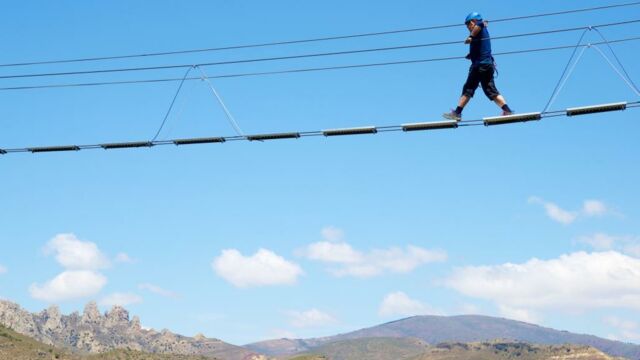It is not uncommon for people to experience a fear of heights. Although this does not generally classify as a serious brain condition, when someone experiences this fear to a grave extent, it can turn into a debilitation phobia. A phobia of heights is called acrophobia.
Discover our latest podcast
Although not a rare phobia, it can cause someone to experience symptoms such as anxiety and panic attacks. As per Forbes Health, about 3% to 6% of those have a fear of heights actively suffer from acrophobia.
As per Brain Facts, neurologist believe that they have been able to pinpoint what happens in the human brain to have such a fearful response to height.
Scientists have pinpointed where fear of heights comes from
Acrophobia in people may be caused by both biological and/or psychological, with such aspects as genetic factors, with any family history of anxiety and phobias coming into play. Again, life experiences can also leave psychological scars that manifests in phobia of various things.
In a paper published in JNeurosci, neuroscientists tried to understand how the brain processes 'the innate fear of heights.' The findings suggests that, the basolateral amygdala (BLA) is responsible for the way we experience the fear of heights.

The paper draws its conclusions from studying mice that were placed in a platform about 8 inches above the ground and their BLA examined, states,
A subpopulation of BLA neurons exhibits a selective response to height and contextual threats, but not to other fear-related sensory or anxiogenic stimuli.
The study concludes,
We discovered a discrete set of BLA neurons that respond to both high-place and fear context exposure, indicating a convergence in processing of dangerous/risky contextual information
As per Brain Facts, otherscientists believe more research is needed on the subject before any definitive conclusions can be drawn.
Read more:
⋙ Trypanophobia: Man with needle phobia refuses jab and dies from COVID
⋙ Expert reveals what could happen to your brain an hour before you die
Treatments to address phobia of heights
Forbes quotes David H. Rosmarin, Ph.D., associate professor at Harvard Medical School and founder of the Center for Anxiety, who explains the impact of acrophobia on patients,
Acrophobia is similar to any specific phobia, but the impact can be more substantial if people live and work in big cities with tall buildings or in industries that require travel.
To help with acrophobia, people can seek exposure therapy, where affected individuals are exposed to phobias gradually and in a controlled way.
Relaxation therapy can also help individuals retrain their brain to react calmly to situations that otherwise trigger their phobias.
Read more:
⋙ These common habits are ruining your brain, neurologist warns
Sources used:
Brain Facts: 'Researchers Pinpoint Fear of Heights in the Brain'
JNeurosci: 'Representation of Fear of Heights by Basolateral Amygdala Neurons'
New Scientist: 'We know now what happens in our brain to make us scared of heights'
Forbes: 'Acrophobia (Fear Of Heights): Symptoms And Treatment'















